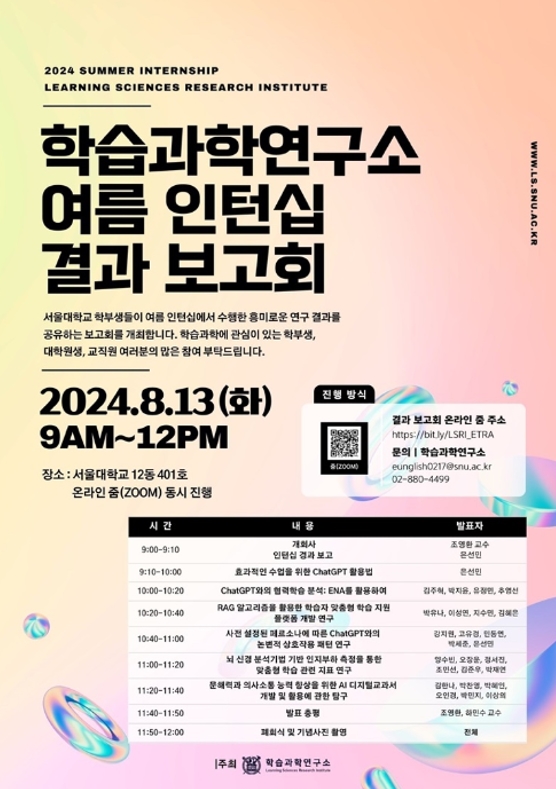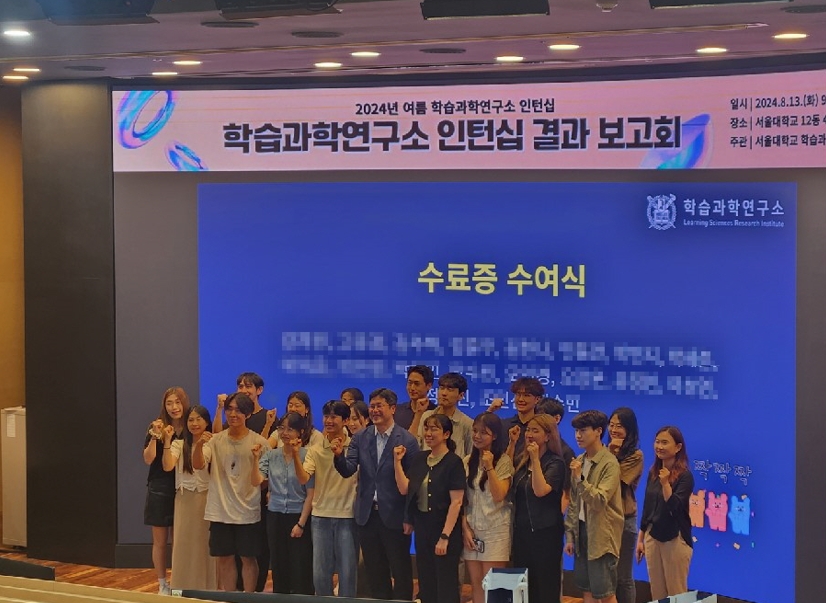On August 13, a presentation regarding the key findings for the Learning Sciences Research Institute Internship was hosted by the Seoul National University Learning Sciences Research Institute. The Institute, founded just last year, pioneers new educational approaches in the era of artificial intelligence, promoting interdisciplinary research across various fields to lead the future of education. This summer, around 20 students spent six weeks studying the fundamental principles of learning sciences. With the guidance of mentors, students conducted independent research on learning analytics, AI learning tools, brain-based learning, and AI-integrated education.

Poster for the Learning Sciences Research Institute Internship Presentation
During the opening session, Eun Sunmin, a PhD candidate in the Department of Education, conducted a brief workshop titled “Using ChatGPT for Effective Teaching.” She discussed how the emergence of generative AI is expected to introduce new educational methods, emphasizing the creation of systems where AI collaborates with both teachers and students. Specifically, she introduced methods for using Application Programming Interfaces (API) to create learning materials and shared examples of personalized instruction using chatbot tools like Mizou and Wrtn. As an example, she showed how chatbots can explain vocabulary through pictures.
Student Presentations in Various Fields of Learning Science
Following this, five student research teams gave their presentations, each exploring innovative aspects of AI in education.
The first set of presentations were focused on learning analytics. Specifically, the first team used Epistemic Network Analysis (ENA) to analyze differences in how learners perceive the role of AI during collaborative learning with ChatGPT. The results were insightful, showing that participants perceived AI in distinct roles: as a peer, a tool, or a mentor. These varying perceptions highlighted the profound impact that learners' views of AI can have on their educational outcomes. For instance, those who saw AI as a peer engaged more interactively, while those who viewed it as a mentor leaned on it for guidance, affecting their learning trajectory. This study suggests that educators should consider how AI is framed within learning environments, as this framing could significantly influence student engagement and success.
The next set of presentations delved into the use of AI personas in educational settings. The third presentation, in particular, focused on argumentative interaction patterns with ChatGPT. The team highlighted the educational potential of AI personas in overcoming the limitations of traditional debate classes, which often struggle to represent a wide range of perspectives. In their study, participants were tasked with writing assignments while interacting with AI personas such as a professional CEO or a conservative Muslim student. This innovative approach allowed the team to analyze how different personas could be used to enhance critical thinking and expose students to diverse viewpoints. The findings suggested that AI personas could be an effective tool in broadening the scope of classroom discussions, making them more inclusive and representative of global perspectives. By incorporating such AI-driven interactions, educational programs could be designed to better prepare students for the complex world they will encounter in the future.
In the field of brain-based learning, the fourth presentation provided an intriguing look into how cognitive load can be measured and utilized to create personalized learning experiences. The team employed neuroimaging techniques to develop indicators that could objectively assess the difficulty of learning tasks. Their research focused on PSAT exam preparation, revealing significant differences between perceived and actual cognitive difficulty. The study’s findings indicated that tasks of mid-level difficulty were most effective in enhancing learning efficiency, as they optimally challenged students without overwhelming them. This research points to the importance of developing tools that can accurately gauge cognitive load, allowing educators to tailor learning experiences to individual needs. Such tools could revolutionize how students prepare for exams and approach challenging material, making learning more efficient and effective.
Together, these presentations underscore the transformative potential of AI in education, from enhancing personalized learning and fostering inclusive discussions to optimizing cognitive load for better learning outcomes. As AI continues to evolve, its role in shaping the future of education becomes increasingly evident, offering new possibilities for engaging and effective learning experiences.

Participants after their certificate of completion of the internship
In the upcoming fall semester, the Learning Sciences Research Institute plans to launch a Learning Sciences Research Support Program for undergraduate students. The program aims to increase interest in learning sciences through fostering creative research topics of the participants’ choice. Continued active research and engagement in the field of learning sciences are anticipated in the future.
Written by Jeemin Suh, SNU English Editor, jiminasuh@snu.ac.kr

